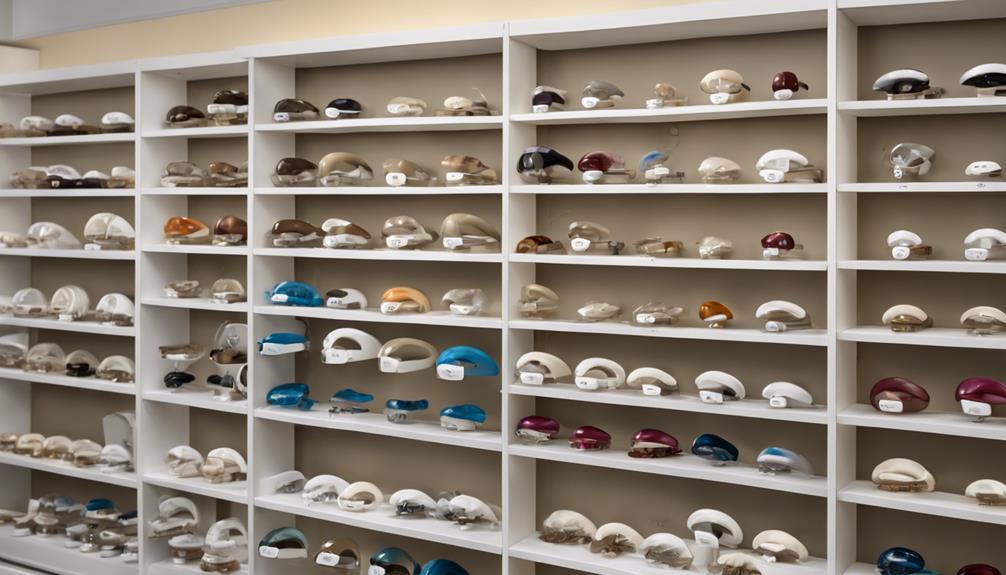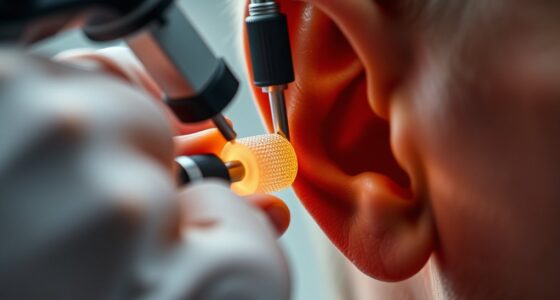Navigating the UnitedHealthcare process to get your hearing aids covered may feel like unraveling a complex maze of information. But fear not, as we have crafted a comprehensive guide to help you smoothly navigate the intricacies of insurance coverage.
From understanding your policy's specifics to exploring in-network providers, these steps will pave the way for a clearer understanding of how to secure coverage for your hearing aids.
So, let's dive in and unravel the mystery behind achieving UnitedHealthcare coverage for your hearing aids.
Key Takeaways
- Understand policy details to maximize coverage
- Seek guidance from hearing care providers
- Submit thorough documentation for approval
- Explore Medicare Advantage and Medigap plans for additional benefits
Understand Your UnitedHealthcare Policy
To maximize hearing aid coverage through UnitedHealthcare, it's essential to thoroughly comprehend the specifics of your policy. When it comes to hearing care, understanding the nuances of your Medicare Supplement Insurance can make a significant difference in the coverage you receive for hearing aids.
UnitedHealthcare policies may include supplemental insurance riders that cover hearing aids, along with yearly covered hearing evaluations as part of the plan benefits. It's important to note that copay amounts for hearing aids can vary, ranging from $375 to $1,425 per device, depending on the policy details.
Additionally, UnitedHealthcare has a partnership with AARP that offers additional coverage options for hearing aids, providing more opportunities to enhance your hearing care benefits. By familiarizing yourself with the specifics of your UnitedHealthcare policy, you can ensure that you make the most of the coverage available to you for hearing aids and related services.
Verify Hearing Aid Coverage Details

We recommend verifying the specific plan names to understand the discounts and coverage details available for hearing devices. When looking into UnitedHealthcare's coverage for hearing aids, it's essential to check which plans offer benefits for hearing devices. Certain Medicare Advantage plans may provide coverage for hearing aids, so it's crucial to confirm if your plan includes this benefit.
Additionally, understanding the copay amounts for each hearing aid, which typically range from $375 to $1,425, can help you plan for potential out-of-pocket expenses.
To ensure you have all the information needed to make informed decisions about your hearing aid coverage, reach out to UnitedHealthcare or check their website for details on participating hearing providers. By knowing which providers are in-network, you can maximize your benefits and potentially lower your overall costs.
AARP members should also inquire about any additional coverage options available specifically for hearing aids, as these may provide further financial assistance.
Consult With a Hearing Care Provider
When considering options for hearing aid coverage under UnitedHealthcare, engaging with a hearing care provider is essential for comprehensive guidance. Here are some key reasons why consulting with a hearing care provider within the UnitedHealthcare network is crucial:
- Expert Assistance: Hearing care providers can offer expert guidance on the coverage options available for hearing aids through UnitedHealthcare.
- Navigating the Process: These professionals can help navigate the often complex process of getting hearing aids covered by UnitedHealthcare, ensuring you understand the steps involved.
- Understanding Benefits: They can assist in clarifying the benefits and limitations of your specific UnitedHealthcare plan regarding hearing aid coverage.
- Personalized Recommendations: By working closely with a hearing care provider, you can receive recommendations on suitable hearing aid models that best align with your individual hearing needs and preferences.
Collaborating with a hearing care provider not only simplifies the process but also ensures that you make informed decisions regarding your hearing aid coverage under UnitedHealthcare.
Submit Necessary Documentation

Upon completing the necessary steps outlined in the coverage guidelines, the next crucial phase for obtaining coverage for hearing aids through UnitedHealthcare is submitting the required documentation.
To ensure a successful claim, it's imperative to submit a completed claim form along with the itemized receipt for the prescription hearing aids and any related services. This should be accompanied by a prescription from a licensed healthcare provider recommending the use of hearing aids.
Additionally, proof of payment for the hearing aids, indicating the amount paid out-of-pocket, must be included. The documentation should be comprehensive, detailing specifics such as the model of the hearing aids and the date of purchase. It's essential to double-check that all necessary information is provided.
UnitedHealthcare may also request additional documentation, so it's advisable to be prepared to submit any further required paperwork promptly. By adhering to these submission requirements, you increase your chances of having your hearing aid expenses covered by UnitedHealthcare.
Appeal Denials if Necessary
If your claim for hearing aid coverage is denied by UnitedHealthcare, consider initiating an appeal process to challenge the decision. When facing a denial, follow these steps to appeal effectively:
- Understand the Timeframe: Ensure you submit your appeal within the specific timeframe provided in your plan documents to avoid missing the deadline.
- Provide Supporting Documentation: Include any additional documentation or evidence that could strengthen your appeal, such as a letter from your healthcare provider detailing the necessity of hearing aids for your condition.
- Review the Decision: UnitedHealthcare will review your appeal and make a determination based on the information you provide, so ensure your submission is comprehensive and addresses the reasons for denial.
- Stay Persistent: Throughout the appeal process, stay proactive and communicate regularly with UnitedHealthcare to inquire about the status of your appeal and provide any additional information they may require.
Utilize UnitedHealthcare Resources

To maximize your access to hearing aid options and support, leverage the resources offered by UnitedHealthcare Hearing network. Explore the UnitedHealthcare Hearing network to discover a wide array of hearing aid options and models that suit your needs. Take advantage of the convenient online hearing test provided by UnitedHealthcare to assess your hearing and determine if hearing aids are necessary. If recommended, schedule an in-person hearing test through UnitedHealthcare Hearing for a comprehensive evaluation of your hearing health.
After obtaining your hearing aids, access follow-up support through either in-person or virtual care to ensure the proper fitting and adjustment of your devices. Remember that coverage for hearing aids is limited to the UnitedHealthcare Hearing network for comprehensive benefits. If you're enrolled in a Medicare Advantage plan through UnitedHealthcare, these resources can be especially beneficial in obtaining the hearing aids you need. By utilizing these resources, you can navigate the process of acquiring and adjusting to hearing aids with ease.
Explore Medicare Advantage Options

When considering Medicare Advantage options for hearing aid coverage, it's essential to understand the basics of the plan, the eligibility criteria for coverage, and the process of enrolling in a UnitedHealthcare Medicare Advantage Plan.
These aspects play a crucial role in determining the extent of coverage for hearing aids and related services. By exploring these points, individuals can make informed decisions about their healthcare needs and coverage options.
Medicare Advantage Basics
Medicare Advantage plans, known as Part C plans, provide additional coverage beyond Original Medicare and are offered by private insurance companies like UnitedHealthcare. When considering Medicare Advantage for hearing aid coverage, here are some key points to keep in mind:
- Additional Benefits: Medicare Advantage plans often include benefits not covered by Original Medicare, such as prescription drug coverage, vision care, dental care, and sometimes hearing aid coverage.
- Specific Coverage: UnitedHealthcare Medicare Advantage plans may offer various options for hearing aid coverage, including discounts, copays, and access to specialized hearing health providers.
- Plan Exploration: Members can explore different Medicare Advantage options to find one that best suits their hearing aid coverage needs and preferences.
- Understanding Coverage: Understanding the specifics of UnitedHealthcare Medicare Advantage plans can help individuals determine the extent of their hearing aid coverage.
Coverage Eligibility Criteria
As we explore Medicare Advantage options, understanding the coverage eligibility criteria for hearing aids becomes crucial. Medicare Advantage plans offered by UnitedHealthcare provide coverage for hearing aids through supplemental insurance riders. Yearly covered hearing evaluations are part of the plan, ensuring regular monitoring of hearing health. Copay amounts for hearing aids under UnitedHealthcare Medicare Advantage plans vary from $375 to $1,425 per device. Additionally, AARP members can access extra coverage options for hearing aids through partnerships with UnitedHealthcare. Specific UnitedHealthcare Medicare Supplement (Medigap) Plans, such as AARP® plans, offer discounts on hearing aids and additional benefits for members.
| Coverage Eligibility Criteria | ||
|---|---|---|
| Plan Type | Coverage Inclusions | Copay Range |
| Medicare Advantage | Yearly evaluations | $375 – $1,425 per device |
| AARP Member | Additional coverage | Varies based on plan |
| UnitedHealthcare Medigap Plans | Discounts on hearing aids | Varies based on plan |
Enrolling for Coverage
Wondering how to secure coverage for hearing aids through UnitedHealthcare Medicare Advantage plans? When enrolling in a UnitedHealthcare Medicare Advantage plan, consider these steps to explore coverage options:
- Review Plan Options: Compare different Medicare Advantage plans offered by UnitedHealthcare to find one that includes hearing aid coverage.
- Check Supplemental Riders: Look into supplemental insurance riders that may provide additional benefits for hearing aids not covered by basic Medicare.
- Understand Yearly Evaluations: Know that yearly hearing evaluations are part of the UnitedHealthcare Medicare Advantage plans.
- Be Aware of Copay Costs: Be prepared for copays ranging from $375 to $1,425 for each hearing aid under the Medicare Advantage plans.
Investigate Medigap Plan Coverage

Curious about the coverage options for hearing aids under United Healthcare's Medigap Plans? When looking into Medigap plans, it's essential to consider their coverage for hearing benefits. United Healthcare Medicare Supplement Plans offer additional coverage for hearing aids beyond basic Medicare. AARP® Medicare Supplement Insurance Plans, affiliated with United Healthcare, provide discounts on hearing devices for members. Some specific plan names within the Medigap plans offer enhanced benefits tailored towards hearing aid coverage. AARP members can even receive a $100 discount on top-tier technology hearing devices, making hearing care more affordable. These Medigap plans are designed to help reduce out-of-pocket costs for hearing care and devices, ensuring that individuals can access the necessary support without financial strain.
| Medigap Plan | Hearing Aid Coverage |
|---|---|
| Plan A | Basic Coverage |
| Plan F | Enhanced Benefits |
| Plan G | Additional Coverage |
| Plan N | Specific Allowances |
| AARP® Plan | Member Discounts |
Review In-Network Providers

When considering UnitedHealthcare's hearing aid coverage, it's crucial to review in-network providers.
By assessing the provider network, we can determine coverage eligibility criteria and the prior authorization process.
This step ensures that members have access to expert care and services aligned with their needs.
Provider Network Assessment
To assess the provider network for UnitedHealthcare's coverage of hearing aids, we can explore the extensive list of over 7,000 in-network locations offering specialized services from renowned hearing aid brands. When reviewing in-network providers, consider the following:
- Expertise: In-network providers offer a wide range of expertise tailored to individual hearing needs.
- Convenience: Members have the choice between local in-person providers or virtual care options for follow-up support.
- Brand Diversity: The network includes popular hearing aid brands like Beltone™, Oticon, Phonak, and more for diverse options.
- Quality Assurance: Accessing care from in-network providers ensures quality services, convenience, and expert support for optimal hearing aid coverage.
Exploring the in-network providers aligns with our plan to find the best coverage options for hearing aids.
Coverage Eligibility Criteria
In assessing coverage eligibility criteria for UnitedHealthcare's hearing aids, it is crucial to review the list of in-network providers to ensure access to discounted rates and preferred benefits. By choosing in-network providers, you can receive quality care while maximizing your coverage. Below is a table summarizing the benefits of selecting in-network providers for your hearing aid needs:
| Benefits | In-Network Providers |
|---|---|
| Discounted Rates | Yes |
| Preferred Coverage | Yes |
| Quality Care | Yes |
| Maximum Coverage | Yes |
Selecting in-network providers not only ensures cost savings but also guarantees that you receive the best possible care for your hearing aids under your UnitedHealthcare plan.
Prior Authorization Process
Reviewing the list of approved in-network providers is essential for navigating the prior authorization process and ensuring coverage for your hearing aids through UnitedHealthcare.
When reviewing in-network providers, consider the following:
- Network Coverage: Ensure the provider is part of UnitedHealthcare's network to avoid out-of-network costs.
- Authorization Requirements: Understand the specific criteria that need to be met for approval of coverage.
- Negotiated Rates: Confirm that the provider accepts negotiated rates from UnitedHealthcare to avoid unexpected expenses.
- Streamlining Process: Contact UnitedHealthcare to inquire about prior authorization requirements and expedite the coverage process.
Stay Informed on Policy Updates

Regularly monitoring UnitedHealthcare's policy updates is essential to staying informed about any changes in hearing aid coverage eligibility and benefits. By staying abreast of any modifications to the policy, individuals can take advantage of new coverage options or benefits related to hearing aids.
Being aware of any updates that may affect eligibility for hearing aid coverage allows for proactive decision-making. Reviewing the policy updates helps in understanding the criteria for qualifying for hearing aid benefits, ensuring that individuals meet the necessary requirements.
Staying updated on the latest information is crucial for making informed choices regarding hearing aid coverage. Better hearing starts with being informed and knowledgeable about the policy updates, as this empowers individuals to navigate the coverage options effectively.
Frequently Asked Questions
Does United Healthcare Pay Anything on Hearing Aids?
Yes, UnitedHealthcare does pay a portion for hearing aids. The copay for each hearing aid can range from $375 to $1,425, depending on the plan.
Yearly covered hearing evaluations are also part of the benefits.
A partnership with AARP provides additional coverage options, and UnitedHealthcare Medicare Supplement Plans offer discounts on hearing aids, with AARP members receiving an extra $100 discount.
What Are Unitedhealthcare Hearing Benefits 2023?
UnitedHealthcare's hearing benefits for 2023 include:
- $0 copay for routine hearing exams
- Access to a variety of over-the-counter and brand-name prescription hearing aids like Beltone™, Oticon, and Phonak
- A 3-year manufacturer warranty on all prescription devices
With a network of over 7,000 locations, members can expect expert care and services. These benefits ensure comprehensive coverage and support for our members' hearing health needs in the upcoming year.
Does Costco Accept Unitedhealthcare for Hearing Aids?
Sure!
Costco doesn't directly accept UnitedHealthcare insurance for hearing aids. However, Costco members can still purchase affordable and quality hearing aids at Costco's Hearing Aid Centers without insurance.
Additionally, Costco's Kirkland Signature brand offers excellent options. If you have UnitedHealthcare and purchase hearing aids at Costco, you may be able to seek reimbursement through out-of-network benefits. This process can help cover some of your hearing aid costs.
Why Are Hearing Aids Not Covered by Health Insurance?
Hearing aids are often not covered by health insurance due to the perception that they're elective devices, not essential medical treatments. Insurance companies may classify them as 'cosmetic' or non-essential, resulting in limited coverage or exclusions.
The high cost of hearing aids, ranging from $1,000 to $6,000 per device, further deters insurance coverage. This lack of support can create financial burdens for individuals who rely on hearing aids for communication and quality of life.
Conclusion
In conclusion, navigating the process of getting your hearing aids covered by UnitedHealthcare can sometimes feel like solving a complex puzzle with missing pieces.
But fear not, with patience, persistence, and a touch of luck, you can unlock the door to better hearing and improved quality of life.
So keep pushing forward, advocating for yourself, and remember that the sweet sound of success is just a phone call away.











